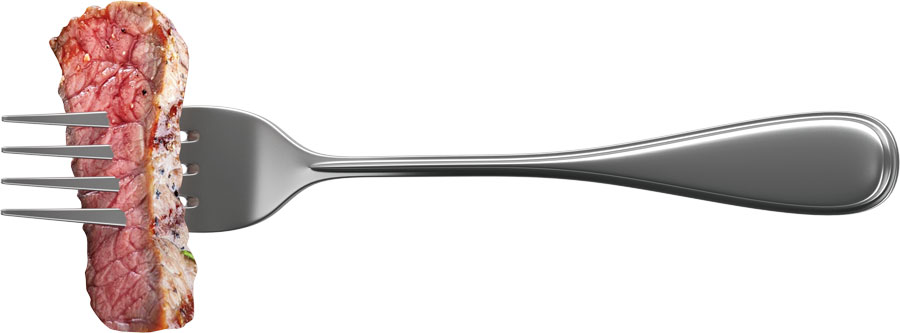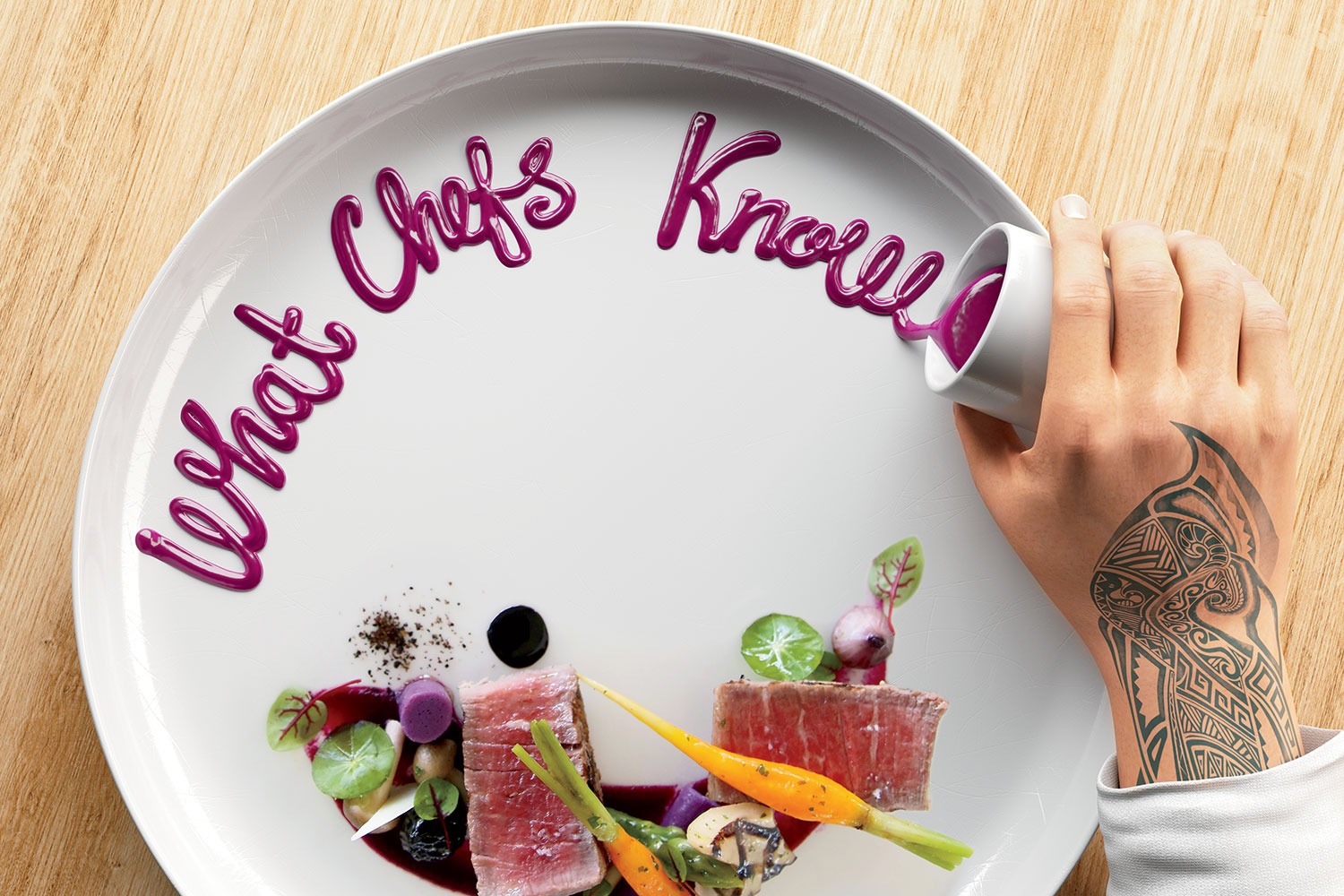In a town obsessed with Michelin stars and tasting menus, chefs have achieved the kind of cachet we used to associate around here with pro athletes. But our fantasies of the cool chef life are not their everyday realities. To pull back the curtain, Chicago spoke, on condition of anonymity, to 16 of the city’s top chefs. A few are from high-end restaurants downtown; others preside over critically acclaimed indie spots; still others run hip neighborhood cafés. They talked about burnout, drunk customers, the tyranny of Yelp, and why people need to learn the difference between an allergy and an aversion. Here, in their own words, is what they know — and what they wish we knew before walking through their doors.

I. “What We Do Is Entertainment”
I think a lot of times chefs put things on the menu to confuse diners. Not maliciously, but they want you to ask a question so the server can go into an explanation of how much work and preparation went into a dish.
The best sandwich in the world might be jambon-beurre: good ham and good butter and good bread. Three things.

Women have one-hour shoes and eight-hour shoes. We know the same thing about restaurant furniture: There are one-hour seats and there are eight-hour seats. And you better be careful if you pick eight-hour seats, because people will camp. There has to be a good balance of comfortable and not too comfortable so people move along.
We want so much to be creative and cutting edge, but over time you realize you really can’t go too far. Did I think I’d have Brussels sprouts on my menu nine years after I thought they were done and over with? I can’t take them off.
How much fucking omakase do we need?
I think Michelin made this town insane. You’re not cooking for your customers anymore, you’re cooking for a tire guide.
Restaurants don’t just sell food and drink, they sell real estate. Customers don’t often realize that, but every seat in a restaurant has a dollar value, and that value goes up the more butts they get in that space.

It’s very hard to have a menu without a chocolate dessert. If I don’t have one, people will just ask me for pieces of chocolate. I’m like, Are you serious? You need chocolate that badly?
When we opened, I didn’t buy bread, I made bread. But there are guys who make really good bread. Why are we fucking around with that? I don’t make cheese either now. And I’ve never had a ham that anybody made in their kitchen that was as good as one from the guys who make ham. The guy who makes sausage for a living makes better sausage than I do. What we’re good at is cooking. And that’s what we need to be focused on.
If you no-call, no-show on a Saturday night, on a four-top, that could have been $500. And $500, in a restaurant this size, that could be my profit for the night. So everything I did today — I came in at 9 in the morning, all my guys worked 14 hours, hustled, bustled, had a great night — I did it for what? I made nothing, because you didn’t show up for your reservation.
Anyone who’s coming here is making a decision to spend their money with us, and to treat them like they’re lucky to be here is crazy to me.
You have to have octopus, you have to have Burrata, you have to have short ribs. You have to have a tartare or a crudo. Mac and cheese, that’s kind of finally gone.
At the end of the day, you have to remind yourself that what we do is entertainment.
Everybody’s hot for a period. And then things level off, no matter who you are. You have to be careful not to compromise everything during that hot period.
If the music in a restaurant is faster, you’ll eat faster. If I slow the music down, you might be here all night.

II. “People Are Just Ready for a Fight”
I love our guests, but some of them are assholes.
I’m not even asking for politeness — just treat us like human beings.
Yelp is a necessary evil. It’s almost like the lifeblood of the industry now, it’s crazy.
We have to order new silverware every two months because people take it.
I remember in pre-internet days, people were nice. They didn’t have this weird vendetta to try to put people out of business.
I’m sure there’s some hippie-dippie diet plan that’s like, “You need to eliminate these things because they’re not interacting with your system well.” But you’re not allergic. You have an aversion.
When I read about that server at the Aviary spitting on Eric Trump — people in the industry think that’s a good thing? It has no place here. That person needs to go to jail.
Customers tell you stuff that you just don’t need to know. You might say hello to someone and they might tell you that they just walked in on their so-and-so with somebody else, or their kid has a heroin problem.
I wish people wouldn’t take off their shoes in public.

One time during service, I look in the vestibule and there’s this guy, obviously homeless, and he’s carrying our gold trashcan from the bathroom. We’re like, “Can we help you?” He says, “It’s my trashcan.” And I say, “No, I’m pretty sure it’s our trashcan.” He says, “It’s my trashcan, but you guys can take it if you want.” He had put all his stuff in it, so I ask, “Can we get you a plastic bag for that stuff?” We dump his stuff into the bag, and I hear this clunk. I look in and see our glass soap dispenser.
In the summer we have our patio doors open, and one time, as soon as we opened them, a rat ran right in. The host stepped on it right as two people walked in the door. He just said, “Um, please have a seat at the bar and I’ll be with you in a moment.” Then he waved to me, and I came over and he pointed down. “What should I do?” I looked at the situation and said, “Put all your weight on that foot. I’m going to go get a box.”
If you have a really great meal and an awful server, there’s a good chance you’re not coming back. If you have a really great server and an awful meal, you may give that place another try.
It’s not easier to change a dish by leaving something off. It’s actually harder.
I wish customers paid attention to closing time. I mean, if we’re open until midnight, I’ll make food up to that point. But at the same time, if it’s 11:55, please keep it to french fries.
There was a dude who would come in by himself, order duck, order wine, tip, leave — and then come back in his bathrobe and slippers, with a cocktail in his hand, and just become more and more abusive till we had to throw him out. It was almost like a whole other person, or a performance art kind of thing, like Joaquin Phoenix.
There’s no space between medium rare and medium.
Everybody thinks that everybody tips 20 percent, and that’s not the case.
Nothing drives me crazier than people who just, fundamentally, do not tip. People who run up $100 tabs at the bar and leave a goose egg — who are these people? You’re American, you know what the deal is.
People are just ready for a fight. Our way of handling them is to disarm them by thanking them for complaining. That usually surprises them.
Mother’s Day is the worst, the most awful people. It’s a forced obligation. Thanksgiving feels more like a celebration. Christmas is more about old family resentments. Easter, everybody’s exhausted and just wants to get their eggs Benedict and a pile of shrimp and get the hell out.
Being Mexican and a chef, I can’t even tell you how many times I would walk through the dining room and be stopped for water.

One Saturday night we realized we’d offered our chef’s table to two different groups. So we sat one, and the manager came to me in the kitchen and said, “Two guys in the other party won’t have it. They said, ‘Tell the other party to leave.’ ” I come out in an apron, and I’m stressed because we’re packed. “How can I help you?” The guy just looked at me like he was going to hit me. I say, “I guarantee you’re going to have a great time. Or you can leave angry. It’s up to you.” So we seat them, and they order huge and drink huge. I call the waitress over and say, “Give me the bill.” And I say, “Take that off, buy that bottle of wine” — I probably take 180 bucks off a $700 bill. The guy walks up to me and says, “Hey, man, I gotta tell you, this is one of the best meals we ever had. And I saw what you did on the bill.” I say, “Aw, well, you know.” He says, “Not good enough.” I say, “Excuse me?” He says, “Yeah, that’s not gonna do it.” “Well, what do you have in mind?” He says, “Comped.” I just say, “Absolutely. Night’s on me, buddy.” I put their names in the book, and they’re never allowed to come back.
There was a metal show at the bar around the corner. These three guys, probably 22 or 23, in metal shirts and all black, come up the walkway, and I’m thinking, It’s pretty weird that they’re going to eat here. But I see two of them break away, and then the third one just starts peeing on the front window.
Things that happen on delivery apps are not our fault. I’ve watched drivers get in their car and get wicked stoned before they bring their food to somebody. Then people call us and say, “My food was cold,” and I say, “What time did it get there? Well, it left here an hour ago.”
When you walk into a restaurant at 7 o’clock and there are some empty tables, that means people are coming for those tables with reservations at 7:15 or 7:30, and those tables are being saved for them. You cannot have those tables.

III. “This Is a Life of Servitude”
When people look at restaurant operators, they’re like, “Oh my God, you guys are the coolest.” But it’s a business that makes money on the fucking pennies. You have labor, you have rent, overhead. The oven doesn’t get turned off, so that gas is burning all day.
I wish I had known some basic plumbing. Basic construction skills would have been helpful.
From the minute I get out of bed, I’m just on my feet all day until I get back in bed.
When I think of who I went to culinary school with, I think there’s one guy besides me who’s still in the industry.

You see young line cooks and their arms are just covered: grease splatter, burns from reaching into the oven. It just takes a second and you’ve got a big blister.
Most of us are so busy that we shove whatever is convenient into our faces. We eat a lot of meals sitting over garbage cans.
This is a life of servitude. That’s what you’ve chosen. And if you’re not OK with that, then choose something else.
There’s a reason why the big restaurant groups don’t have just one restaurant: You need multiples to make it work.
Having time to develop dishes and do research — that doesn’t exist. I do my research in bed, in the 20 minutes before I go to sleep, on my phone, scrolling through Instagram.
This is not a Catherine Zeta-Jones movie about being a chef and you can do whatever you want.

Everybody’s like, I’m gonna be the next Kevin Boehm and Rob Katz. You’re not, because they started Boka in a different world. Donnie Madia and Paul Kahan started Blackbird in a different world. That’s not going to happen again.
You don’t see a lot of chefs over the age of 40 unless they are a chef-owner.
The grasp that alcohol has on the industry — you kind of know it going in, but just how much it’s got its fingers in everything is still kind of shocking.
When you go to culinary school, you think you’re going to come out of there being the next media star. You don’t realize how rare that kind of work is.
There is a generation who were not cooking when Anthony Bourdain was cooking, but really embraced the pirate-ship, smoking-butts-in-the-alley, shots-of-whiskey, hard-living, hard-partying lifestyle. That’s what drew them to this profession — not the love of food.
A big part of this business is failure. I tell young kids again and again: “You want to go to the moon, you gotta kill some monkeys.”
I sometimes have visions of collecting the insurance money. We all have that fantasy, but what else are we gonna do?

IV. “Fear Is Not a Great Motivator”
You can be a very talented cook, but if you can’t manage people, you can’t do the job.
For many years, until I started hiring them, there weren’t many African American cooks besides me at the restaurant where I came up. We’d have an African American server now and then, but cooks — you couldn’t even find them. I can tell you why that is. African Americans see servitude, they don’t see service. The maintenance of the house, of dinner, of being the nanny or the butler — once you escape that, who the hell is running back to it?
I hire from my gut. Oftentimes, my team is like, “What the hell are you doing, man?” And I’m like, “Something about this kid. This could be the one.”
All of the food has to be dialed down to the skill level of the least talented person.
I don’t think I’ve ever fired anyone and been like, “Good fucking riddance, I’m glad they’re gone, our lives are going to be so much better.” Well, there was one person.

The morning crew did not talk to me in English for 30 days because I was a black kid who got promoted over a Mexican cook. And they’re like, “All right, you want to tell us what to do, learn how to speak Spanish.” I won those guys over, they became family, legit, but they challenged the hell out of me.
The kitchen culture is very reflective of who the chef is. They set the tone.
You need policies and systems to run a business. It can’t just be a cult of personality, where one person is dictating things.
Having female ownership and female leadership in the kitchen, you’re more likely to have applicants that are women or are queer.
Fear is not a great motivator. At least, it’s not a sustainable one.
Two or three years ago, I was like, “I cannot wait to replace you motherfuckers with robots.” I actually said that to a cook.
I’m specifically trying to find people who are a little bit weird. Not just in the traditional sense — everyone’s all tatted up and has piercings — but, like, artists and sculptors who have skills that apply to what we do.
People in kitchens have a tremendous amount of love and maybe didn’t have an avenue to express that, or maybe didn’t come from a place where they were loved.
I think I’ve done a great service to a few people by sitting them down and saying, “What do you want to do when you grow up? Because this is not for you.”
We had this extern from culinary school who showed up late three days in a row, so the sous chef told the guy to polish all the copper in the kitchen. The guy polished all the copper pots and pans and said, “I’m done, Chef.” The sous chef said, “No, I said all the copper. Now you have to polish the copper pipes.” So then the guy cleaned the copper pipes and said, “I’m done, Chef.” But the sous chef had gone around to everyone in the restaurant collecting pennies, and he had this pint deli cup full of them. “I said all the copper in the restaurant.” So the guy had to polish all the pennies. He was polishing copper for literally 13 or 14 hours. And then the kid never came back. You did all that and never came back?
I think it’s really important to teach our staff that these ingredients aren’t free. We’re a small restaurant — you gotta find out how to get creative with all the different parts of everything.
I teach my staff about numbers and empower them because no one did that for me. I don’t care how great your food is, if you don’t teach running a business to your staff, who look up to you, you failed.





